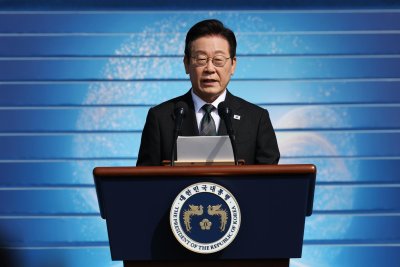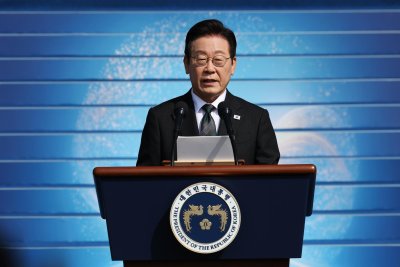
South Korean President Lee Jae Myung on Thursday apologized for the country’s troubled history of overseas adoptions, acknowledging that “unjust human rights violations” occurred. In this photo, he is delivering a speech to mark the 77th Armed Forces Day on Wednesday. Pool Photo by Kim Hong-ji/EPA
SEOUL, Oct. 2 (UPI) — South Korean President Lee Jae Myung on Thursday apologized for the country’s troubled history of overseas adoptions, acknowledging that “unjust human rights violations” occurred and vowing stronger safeguards going forward.
“South Korea once bore the shameful stigma of being a ‘child exporter,'” Lee said in a Facebook post.
“While some found loving adoptive families, many suffered their entire lives due to the irresponsibility and inaction of certain adoption agencies,” he said. “My heart is heavy when I think of the anxiety, pain, and confusion of international adoptees who were thrown alone into a foreign land at a young age.”
In March, a long-awaited report by South Korea’s Truth and Reconciliation Commission found that the government violated adoptees’ rights as it sought to expedite overseas adoptions rather than strengthen domestic welfare programs. The report highlighted fraudulent practices such as document falsification, infant substitution and inadequate vetting of adoptive parents.
At least 170,000 South Korean children and babies were sent overseas since the end of the 1950-53 Korean War, particularly in the 1970s and 1980s as the country went through a period of explosive economic growth.
Lee noted that even in the 2020s, long after South Korea had become an economic power, an average of more than 100 children per year were still being sent abroad for adoption.
Acknowledging the “unjust human rights violations” cited in the TRC report, Lee said that there were instances where the government “failed to fulfill its role in this process.”
“On behalf of the Republic of Korea, I offer my sincere apologies and condolences to the international adoptees, their families, and their families of origin who have suffered,” he said.
The president’s remarks came one day after South Korea formally became a party to the Hague Adoption Convention, an international treaty meant to establish safeguards for intercountry adoptions. Seoul ratified the treaty in July, some 12 years after signing the pact.
Moving ahead, Lee called on government ministries to “protect the rights of adoptees and establish a human rights-centered adoption system.”
“I also urge them to devise effective support measures to help international adoptees find their roots,” he added.
